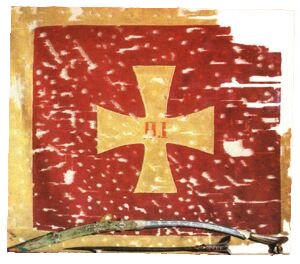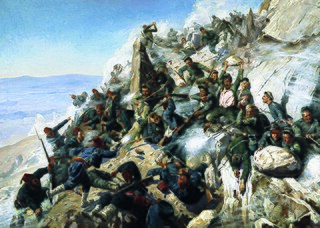 W
WThe First Balkan War lasted from October 1912 to May 1913 and involved actions of the Balkan League against the Ottoman Empire. The Balkan states' combined armies overcame the initially numerically inferior and strategically disadvantaged Ottoman armies and achieved rapid success.
 W
WThe First Scutari War was an armed conflict in 1405–1412 between Zeta and the Venetian Republic over Scutari and other former possessions of Zeta captured by Venice.
 W
WThe Great Turkish War or the War of the Holy League was a series of conflicts between the Ottoman Empire and the Holy League consisting of the Habsburg Monarchy, Poland-Lithuania, Venice and Russia. Intensive fighting began in 1683 and ended with the signing of the Treaty of Karlowitz in 1699. The war was a defeat for the Ottoman Empire, which for the first time lost large amounts of territory. It lost lands in Hungary and the Polish–Lithuanian Commonwealth, as well as part of the western Balkans. The war was also significant in that it marked the first time Russia was involved in a western European alliance.
 W
WThe Montenegrin–Ottoman War, also known in Montenegro as the Great War, was fought between the Principality of Montenegro and the Ottoman Empire between 1876 and 1878. The war ended with Montenegrin victory. Six major and 27 smaller battles were fought, among which was the crucial Battle of Vučji Do.
 W
WThe Russo-Turkish War of 1877–1878 was a conflict between the Ottoman Empire and the Eastern Orthodox coalition led by the Russian Empire and composed of Bulgaria, Romania, Serbia, and Montenegro. Fought in the Balkans and in the Caucasus, it originated in emerging 19th-century Balkan nationalism. Additional factors included Russian goals of recovering territorial losses endured during the Crimean War of 1853–56, re-establishing itself in the Black Sea and supporting the political movement attempting to free Balkan nations from the Ottoman Empire.
 W
WThe Second Balkan War was a conflict which broke out when Bulgaria, dissatisfied with its share of the spoils of the First Balkan War, attacked its former allies, Serbia and Greece, on 16 (O.S.) / 29 (N.S.) June 1913. Serbian and Greek armies repulsed the Bulgarian offensive and counter-attacked, entering Bulgaria. With Bulgaria also having previously engaged in territorial disputes with Romania, this war provoked Romanian intervention against Bulgaria. The Ottoman Empire also took advantage of the situation to regain some lost territories from the previous war. When Romanian troops approached the capital Sofia, Bulgaria asked for an armistice, resulting in the Treaty of Bucharest, in which Bulgaria had to cede portions of its First Balkan War gains to Serbia, Greece and Romania. In the Treaty of Constantinople, it lost Edirne to the Ottomans.
 W
WThe Second Scutari War was an armed conflict in 1419–1426 between Zeta (1419–1421) and then the Serbian Despotate (1421–1423) on the one side and the Venetian Republic on the other, over Scutari and other former possessions of Zeta captured by Venice.
 W
WWorld War I was a global war originating in Europe that lasted from 28 July 1914 to 11 November 1918. Contemporaneously known as the Great War or "the war to end all wars", it led to the mobilisation of more than 70 million military personnel, including 60 million Europeans, making it one of the largest wars in history. It is also one of the deadliest conflicts in history, with an estimated nine million combatant deaths and 13 million civilian deaths as a direct result of the war, while resulting genocides and the related 1918 Spanish flu pandemic caused another 17–100 million deaths worldwide, including an estimated 2.64 million Spanish flu deaths in Europe and as many as 675,000 Spanish flu deaths in the United States.
 W
WWorld War II, also known as the Second World War, was a global war that lasted from 1939 to 1945. It involved the vast majority of the world's countries—including all the great powers—forming two opposing military alliances: the Allies and the Axis. In a state of total war, directly involving more than 100 million people from more than 30 countries, the major participants threw their entire economic, industrial, and scientific capabilities behind the war effort, blurring the distinction between civilian and military resources. World War II was the deadliest conflict in human history, marked by 70 to 85 million fatalities. Tens of millions of people died due to genocides, premeditated death from starvation, massacres, and disease. Aircraft played a major role in the conflict, including in the use of strategic bombing of population centres, and the only uses of nuclear weapons in war.